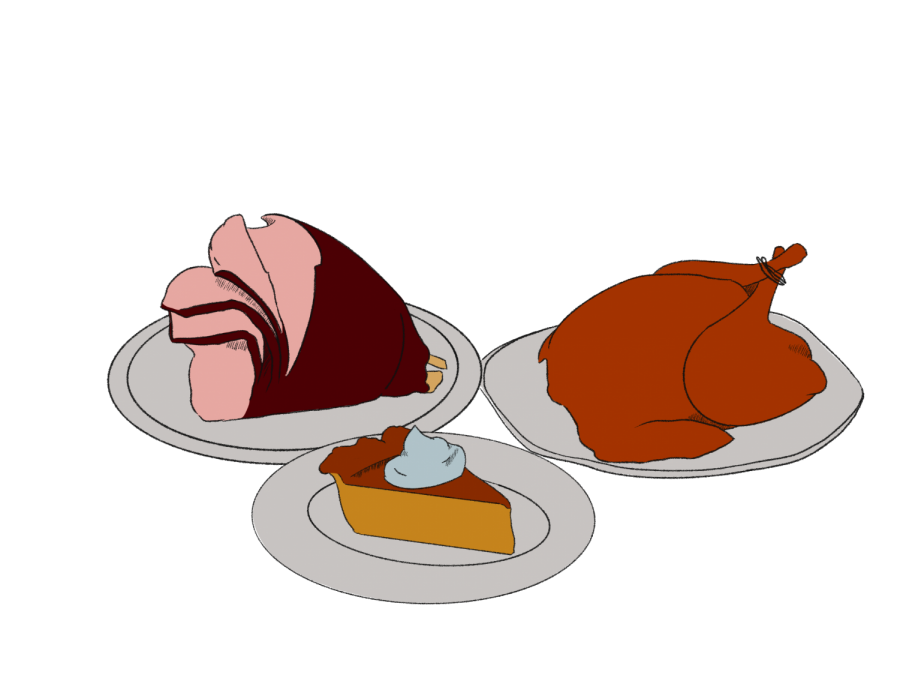Have you ever been too shy to go for seconds? Or regretted wearing jeans to a big dinner?
As we dive into the holiday season, it gets hard to resist the need to scarf down all the homemade food (especially as a college student). Whether you tend to overeat or hold yourself back, intuitive eating skills can help people feel a little less guilty about what we put on our plates.
Tyler Rolling, nutritionist and health educator, spoke to San Diego State students on Nov. 24 to prepare their stomachs for the holiday season. She described intuitive eating as an alternative to dieting and more of a “mind-body approach to nutrition.”
“All food is okay to eat, especially if you enjoy eating it,” Rolling said. “(Dieting) ends up restricting the food we actually want and we are more likely to binge on that food later or other food.”
The eating framework consists of 10 principles:
- Reject the diet mentality
We have all heard of “good foods” and “bad foods,” but Rolling said this mindset can be dangerous. With diet rules and mentalities, people tend to restrict themselves, binge eat, then gaining weight and feel ashamed.
The endless cycle of guilt can be broken by abandoning diet culture and recognizing its dangers.
- Honor your hunger
If your stomach is still grumbling, go in for those seconds! Intuitive eating is all about focusing on what your body truly needs and listening to hunger and fullness cues.
This also means not fasting all day just to scarf down the big meal.
- Make peace with food
Give yourself permission to eat what you want.
By restricting yourself, you are more prone to uncontrollable cravings and binging.
Anola Sanders, a nutrition graduate intern, suggested putting food into a more biased perspective.
“Don’t demonize a food group because you think it is bad for you, or idolize one because you think it’s good,” Sanders said. “Food is not morally good or bad.”
- Challenge the food police
Holidays can be difficult with friends and family making snarky comments about your eating.
Often, it can lead to food shyness or insecurities.
There are also “food police” that live inside our minds, telling us what we should eat and what to avoid. Sanders suggested challenging these ideals, questioning “who set them, why are they in place and why are they bad?”
- Respect your fullness
Sending ourselves into a food coma has become the norm during the holiday season. Instead of sitting in discomfort, consider when it is time to stop. Take breaks and have conversations in between bites.
A good rule of thumb, according to Rolling, is asking yourself, “If I take one more bite, is that going to make me overstuffed, or will I be okay?”
- Discover the satisfaction factor
There is a difference between feeling full and feeling satisfied. You can fill yourself up with food, but if it was not what you wanted, the urge to want more will still be there.
Be mindful about what you choose to eat and consider whether or not you enjoy it.
- Respect your body
It may sound cliche, but there is no way around it— in order to feel comfortable with your body, you have to love it.
Instead of criticizing how you look, consider all the things that make you beautifully unique. Every part of your body works each day to keep you alive and healthy! Treat it with the same love.
- Honor your feelings without using food
Emotional eating is common when we feel lonely, sad or bored. When you feel this happening, distract yourself with other activities, such as reading, taking a walk, drawing, or calling a friend.
- Exercise and feel the difference
Working out is not limited to running or lifting weights. Think about moving your body by the ways you enjoy such as dancing, swimming, or hiking. Being outside and feeling your body move is not only rewarding, but energizing.
- Honor your health gently
Remember that there will be good and bad days. Do not judge yourself for your eating choices, just consider what makes you satisfied and when you feel full.
It is about progression, not perfection.











